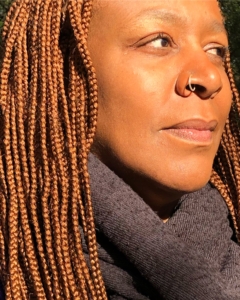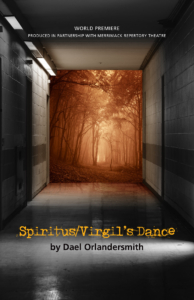INTERVIEW WITH DAEL ORLANDERSMITH
Researched, interviewed, and edited by Sharon J. Anderson, CATF Honorary Board Member
“Spiritus” is Latin for “breathing.” There is so much breathing and movement in this play, even on the page – all that white space; the words seem to “breathe” and “dance” on the page, like visual poetry. Why do you write this way?
I have synesthesia.* People tried to correct it when I was a child because they didn’t understand it, and neither did I. Someone would be talking, but I would hear Jimi Hendrix music and see a Degas painting. It’s the way I connected to the world, and still do. It’s a fusion; a mixture of writing, music, and painting. I then put this fusion into a theater structure with a beginning, a middle, and an end; a story, a conflict, a resolution.
What poets have influenced you?
The French canon is very important to me – poets such as Rimbaud and Baudelaire. I also appreciate Virgil, early Maya Angelou, and Langston Hughes. Poetic writers like Toni Morrison have been a major influence as well. Most recently, I’ve found the poetry of Nick Cave to be very interesting. He has lost two sons, one just last May. His album, Ghosteen, with his band, the Bad Seeds, was written after the loss of another son, Arthur, in 2015. It deals not so much with religion, but Spirit. He is an avid reader of the Old and New Testaments, but is not “born again.” I’m fascinated with his take on how one wrestles with Spirit.
This play is about death in life – the dullness that Virgil sees in her parents which impels Virgil to ask where the “fullness” is in her life: “Why am I here? What is my purpose? What is my more?” Dostoevsky said, “The mystery of human existence lies not in just staying alive, but in finding something to live for.”
It takes a lot of courage to travel on a new path. Don’t you think we have a responsibility to know how to live our lives? I’m in the last part of my life, and I think my responsibility is to invent and re-invent and give birth to myself. I don’t say that easily, mind you. I can whine about it, but my responsibility is not to whine. My responsibility is to give birth to myself.
You have said, “As I get older, there are three words I want to keep reminding myself of: “I don’t know.”
As a young woman, I thought I knew so much and it was coming from a place of defense. Now it’s being open to being old and not knowing everything. It’s very hard. With the exception of some physical stuff, I like my life more than when I was a young person.
James Hollis, a Jungian psychoanalyst, wrote a book called The Middle Passage in which he examines the gifts of depression. One of those gifts is that depression alerts you to something you are doing that is no longer working. When Hollis was 45 or 50, he left his first wife because they both knew that they were just “showing up” for their relationship. They were only “phoning it in.” You call that living? No. I am making changes in my life in order to live, to show up for my work.
Virgil sees “death in life” but then learns, “life in death.” The death of Virgil’s mother brings her feelings of being unmoored into sharp focus. Jimmy, the funeral director seemed to know Virgil’s mother better than Virgil and her siblings. Peggy, the hospice nurse who cared for Virgil’s father before he died, reveals much about Virgil’s father. Jimmy and Peggy knew more than Virgil about her parents because they listened. We don’t listen very well.
No, we don’t, and it’s easy to simply blame technology, but we’ll always have technology. Innately, perhaps we don’t listen because we are afraid to look at ourselves. We have to look. And we have to listen. You can learn so much in silence. You can turn loneliness into solitude.
In her book, All About Love, bell hooks writes that grief in its most basic form is an expression of love: “To be loving is to be open to grief, to be touched by sorrow, even sorrow that is unending.”
That is beautiful, just beautiful, and I’m not there yet.
You witnessed an embalming. The details of embalmment in your play are searing.
I am still processing what I saw. I went to Baton Rouge and visited an embalming room where there were five bodies. Another room in the back had two bodies and then there was refrigeration. As Mark, the embalmer, was showing me around, he shared that this was his calling; that he always knew he wanted to do this.
I watched him touch the bodies, wash the bodies, massage the bodies. He was constantly moving around these bodies. He said solemnly, “This was a human being.” Everyone who worked there believed that was their calling.
A young lady was also in the room with her aunt’s body. “I want my aunt to look great and be buried well, so somebody else is coming in later on to put on her makeup.” Then she and Mark worked on her aunt. When they were finished, they opened the refrigerator, and I saw three small bodies. I knew they were babies. They told me that it was hard to work on babies or pregnant people. Then they told me a horror story about a mother on fentanyl whose beautiful child, who was about three or four, died from an overdose of alcohol after the mother gave it three to four shots of booze. I asked Mark about the mother and he said, “That bitch is still alive, but she is still human. I’m trying to figure out what possessed her to do this. She has to live with this the rest of her life.”
And that is another form of death. How do you live with what you’ve done? How do you come to terms with what you’ve done?
The poem at the end reads like a benediction, “Beyond the guards of light and sky and skin and bone and work . . .” – what inspired those words?
I was thinking about figurative and literal ascension – how do we become good? Where is the good? You get to a point where you can’t blame your parents all the time, you can’t blame this, you can’t blame that. As I get older, I don’t just think of the people who hurt me, but also the people who I hurt. I’ve got a mouth on me.
You have described the role of playwrights as, “being mental and emotional travelers who are fearless in terms of looking at ourselves and in terms of the writing that we do; to dig into ourselves and to be honest – as beautiful as that is and as ugly as that is.”
Most of the time we do know what we are afraid of, but most of the time, we don’t want to look at what we’re afraid of. Playwrights have to look.
You love this line from Jennifer Lash’s book, Blood Ties: “Artists are like the saints or receivers, their job is to summon every emotion, every skill to remain skinlessly alert in order to, as Picasso says, ‘find.’” Find what?
I simply think, find.
You tend to lean toward darker work because you want to give permission for others to feel uncomfortable with what’s there. “We find humanity by exposing the darkness,” you’ve said.
To me darkness is the way to get to the light. When you look at Harold Lloyd hanging from a clock, do you ever wonder how he got there? We’re laughing at the ridiculousness of it, but how did he get there? Think about it. You’re hanging from a clock. That’s kind of dark. It’s not just gloomy, goth stuff.
“There is nothing more gorgeous than being in a room with a play or watching someone on a stage delineate the human condition.” Your perspective here reminds me of Chisa Hutchinson’s perspective in her CATF interview this year: “I read somewhere that when people watch live theater together, their heartbeats synch up.”
That’s gorgeous, too. Chisa is awesome. We are all now back in the theater, and we can see the spit and we can see the sweat. That’s really cool. I used the adjective “gorgeous” in my perspective because “beautiful” is just too bland. “Gorgeous” is so spontaneous. When something is gorgeous, you just want to eat it, lick it, bite it, grab it, hold it. That’s gorgeousness to me. It’s so immediate.
What is your greatest strength?
Working.
What is your greatest weakness?
A lack of compassion for certain people.
*Synesthesia is the production of a sense impression relating to one sense or part of the body by stimulation of another sense or part of the body.


